Brian Murphy's Blog, page 11
September 18, 2024
Weird Tales of Modernity: Elevating the artistry of the Weird Tales Three
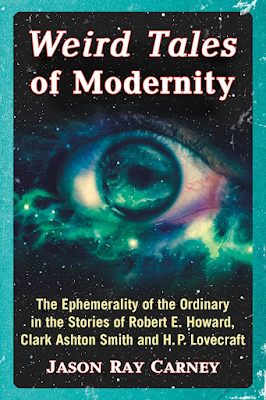 Pulp and other forms of genre fiction have become not just an accepted form of entertainment, but an acknowledged outlet for meaningful artistic expression. But this is a relatively recent phenomenon. For more than a century literary critics shunned pulp, categorizing it as cheap entertainment for coarse consumers, junk food devoid of value. Some actively discouraged its consumption.
Pulp and other forms of genre fiction have become not just an accepted form of entertainment, but an acknowledged outlet for meaningful artistic expression. But this is a relatively recent phenomenon. For more than a century literary critics shunned pulp, categorizing it as cheap entertainment for coarse consumers, junk food devoid of value. Some actively discouraged its consumption.Today literary elites no longer dictate broad cultural tastes—or if any do, they certainly wield less power and influence than the likes of Harold Bloom, Edmund Wilson and William Dean Howells once did. At least from my limited perspective.
But one result of this century of neglect is comparatively few literary studies. Only recently have we seen a steady uptick with the likes of Jonas Prida’s Conan Meets the Academy (2012), Justin Everett and Jeffrey Shanks’ The Unique Legacy of Weird Tales (2015), Mark Fisher’s The Weird and the Eerie (2017), Bobby Derie’s Weird Talers: Essays on Robert E. Howard and Others (2019), John Haefele’s Lovecraft: The Great Tales (2021), and Stephen Jones’ The Weird Tales Boys (2023). We have plenty of catching up to do, which makes Jason Ray Carney’s Weird Tales of Modernity (McFarland, 2019) a welcome volume. It’s a work that certainly deserves more attention. I recommend it strongly, with a few caveats.
The first caveat is price. McFarland describes itself as a leading independent publisher of academic and general-interest nonfiction books, but academic publishers typically charge more due to their small print runs, and McFarland, though cheaper than some academic presses, is still pricey. This book runs nearly $40 new at just under 200 pages.
The second is accessibility. Weird Tales of Modernity is a challenging read. It took me a while to get into the flow due to the denseness of Carney’s language and use of academic jargon. I have a degree in English and have read (and even appreciate) academic writing, but it’s been a while since I tackled such material and needed to shake off a little rust to get back into that headspace. It probably also assumes a little too much familiarity with literary modernism.
But once I acclimated to the language I both enjoyed Weird Tales of Modernity as an entertaining read, and for the compelling case it makes for the literary merits of H.P. Lovecraft, Clark Ashton Smith, and Robert E. Howard. Carney’s central thesis is that the “Weird Tales Three” were not just producing entertainment, but contributing meaningfully as original artists writing in reaction to literary modernism.
This would be a good time to explain that particular term.
Literary modernism was an experimental mode of fiction in vogue from roughly the late 1800s to the early 1940s, peaking in the interwar period (1920-39)—roughly concurrent to the literary output of Howard, Lovecraft, and Smith. It was a time marked by profound disillusionment in institutions and doubt that universal truth and human progress were possible. Rapid changes in technology and industrialization coupled with the carnage of World War I made old certainties a shifting sand.
Amid these rapid changes artists such as T.S. Eliot, James Joyce, William Faulker, and Virginia Wolfe adapted modes of literary expression to match, abandoning old traditions and pioneering new prose and poetry techniques--slice of life, introspection, emphasis on realism, abandonment of meter and rhyme in poetry. As the old sureties in life were slipping away, they sought to achieve immortality through “art in amber,” even if just in limited, fragmentary glimpses. A chief example is Joyce’s Ulysses (1922), a dense and sprawling work which depicted the events of 24 hours in the life of Leopold Bloom.
Carney argues that Smith, Lovecraft, and Howard were aware of this movement, but instead of engaging in it produced stories of shadow modernism, “strange art, artists, and experience of art created in reaction to modernity.” Howard’s decaying cities and corrupt civilizations and Lovecraft’s Great Old Ones and uncaring, indifferent cosmicism were symbolic representations of the terrible ephemerality that lurked behind the seeming consistency of our day-to-day lives—the inevitable march of time and the subsequent corruption and decay of all human endeavor. The Weird Tales Three saw through this veil and understood the ephemerality of life—the “ephemerality of the ordinary” as Carney repeats in an oft-used phrase. “Irrespective of tribe, race, clique, or coterie, we are all ephemeral forms trembling in strange stasis destined for formlessness.”
Capturing the ephemerality of human endeavor required more than the language of literary modernism could provide. It required fantastic and extraordinary literary techniques married to the techniques of the Gothic novel—hallmarks of the Weird Tales Three. Writes Carney, “After many creative iterations honed over several stories—e.g., Pickman’s demented art, Malygris’s sorcery, the fell mirrors of Tuzun Thune—this shadow modernism becomes an inhuman form of technology that, functioning like a cognitive prosthesis in the virtual world of fiction, thereby reveals the secret truth of history: history is a cruelly accelerating process of deformation. The ordinary is ephemeral. History is the interplay of form and formlessness with formlessness terminally ascendant.”
Carney does an impressive job supporting his thesis with multiple references from the literature, both from mainstream modernist writers and from Howard, Lovecraft, and Smith. I found his arguments original and convincing, offering new insights and perspectives I hadn’t previously considered. If you take these writers seriously it’s a book you ought to seek out.
In addition to his scholarship Carney has done much of note for sword-and-sorcery and the broader field of pulp fiction. His efforts building the online Whetstone discord community (which recently shut down after a notable run of some five years), initiating the Trigon awards and associated conference, organizing academic panels at Howard Days, and of course establishing the Whetstone Amateur Magazine of Pulp Sword-and-Sorcery, served an important function for many. We’re all on the same path of dissolution and formlessness, which makes any efforts to make sense of the art we enjoy while offering warmth and community for other like-minded souls deeply appreciated and sorely needed. Weird Tales of Modernity and Carney’s broader oeuvre serve as a bulwark against the ephemerality of the ordinary.
This review also appeared on the blog of the Rogues in the House podcast.
September 11, 2024
Prayers for Howard Andrew Jones, ardent sword-and-sorcery champion
 The great HAJ, author of Lord of a Shattered Land
The great HAJ, author of Lord of a Shattered LandAlthough we’d never met in person, Howard is much more than just an author whose works I admire. He’s a person I admire.
Relentlessly optimistic.
Passionate and informed.
Encouraging and welcoming.
And after all that, he’s also a darned good writer responsible for some books I enjoyed, and recommend you seek out.
I got to know Howard a bit through an online Discord community, Whetstone, which has recently shuttered. We also served together on a Rogues in the House podcast and a video panel, The Best of Sword-and-Sorcery.
But despite meeting him in online venues only, I feel like I knew him.
I’ve heard it said that if an author writes in enough volume, and truly, that he will inevitably end up on the page. I’m not sure if I fully believe this, but I do believe it in the case of Howard.
He was Hanuvar. Relentless in his work, honorable, hopeful that one day he might succeed in his mission.
He was also The Skull, mascot of Tales from the Magician’s Skull , the sword-and-sorcery magazine he edited for Goodman Games. Relentless in his love of sword-and-sorcery, and threatening immolation for anyone who profaned the sacred genre. He reduced many interns to ash, all in good humor of course.
He was a tireless champion of Harold Lamb, whose stories he assembled in an eight-volume “Harold Lamb Library” series for Bison Books. Howard constantly shoehorned Lamb into every conversation about early pulp adventure writers, which was endearing but also opened many eyes (including my own) to Lamb’s underappreciated influence and greatness. Instead of “GOAT-ing” Harold as all-time Lamb champion, we’ll bison him, I guess.
I’m hoping against hope that somehow we might get more stories from his pen. I hate talking about him in past tense, because he's still very much alive. But the news does not sound good.
Cancer steals people in their prime, with no warning. Cancer stole someone near to me, now it threatens Howard’s life. It is an absolute scourge and I hope one day I might live to see it eradicated, or driven back to the pits of hell from whence it came, like Conan did to Thog in Xuthal of the Dust.
Life can be absolute shit.
This heavy news is yet another reminder to live every moment like it matters. Because they all do, and we never know when it may all be taken away.
Prayers for Howard and his family.
September 6, 2024
Resurrection, Rob Halford
In the late 90s heavy metal was in shambles. A Mad Max wasteland, fans squabbling over the little juice that remained like savage, scavenging bikers. The mutated blight of grunge and nu metal (Jesus I hate even typing nu metal) had dropped a steaming deuce on anything resembling taste, talent, or actual heavy metal. It was a dried out, sad, creatively bankrupt, pathetic wasteland of terrible music, suffused in the outflow of the great septic tank of post hair-metal apocalypse.
God I hated this period.
And please don't try to change my mind. It sucked, hard. I saw it all, first hand, at multiple Ozzfests and a lot of shitty listening sessions in college surrounded by assholes in flannel. Yes, I gave it the old 'college try,' for FOUR FUCKING YEARS, and it sucked, Pearl Jam and all.
I saw Limp Bizkit come out of a toilet, literally, at Ozzfest. They should have stayed there. I'd gladly hit flush, as the world cheered.
Spare me your nostalgia and stories; this was fucking dark times for heavy metal.*
And then came 2000.
Iron Maiden came roaring back with Brave New World, and Rob Halford came out of a post Judas Priest funk with Resurrection. And suddenly the world tilted back on its correct axis, and all was right again.
Heavy metal was back.
"Resurrection" was Halford telling the world, "Fight and 2wo were interesting ... okay not 2wo. But I needed these albums at this point in my life. I've gotten them out of my system. Now? Fuck that noise. I'm back, with legit music."
This was a repudiation of the 1990s. Don't believe me? Here's the lyrics:
I'm digging deep inside my soulTo bring myself out of this god-damned holeI rid the demons from my heartAnd found the truth was with me from the start
Holy angel lift me from this burning hellResurrection make me whole
This song is awesome. It resurrected heavy metal.
Listen and enjoy. And remember how fragile it all is, boys.
* I don't hate you, I just think you have terrible taste in music.
August 30, 2024
Of artistry, addiction, and self-discovery: Forthcoming memoir of fantasy artist Tom Barber
Tom Barber at the canvas.The arts are not a way to make a living. They are a very human way of making life more bearable. Practicing an art, no matter how well or badly, is a way to make your soul grow, for heaven’s sake.
--Kurt Vonnegut
Tom Barber was working in a commercial art studio in the mid 70s when he walked into a local bookstore while on lunch break. He found a book of illustrations by N.C. Wyeth, picked it up, leafed through it.
Returning to work, he marched in to his boss’ office and gave his two-week notice.
“I didn’t know what I wanted to do, but after looking at those paintings I knew it was something along those lines,” he said.
That “something” was a lifelong commitment to the creative muse over the commercial. Wherever that path would take him.
Tom assembled a portfolio for Houghton Mifflin, a Boston publisher specializing in children’s books. And was promptly humbled. “I got my first interview with a real art director,” he said. “He looked through my work and told me I ought to find another line of work.”
Stung but undeterred, Tom took his ideas in a new direction. An architect friend reviewed his work and saw something the art director didn’t. He asked Tom if he’d ever been to a sci-fi convention. Tom hadn’t. So he painted several pieces and attended his first convention, art in tow.
And promptly sold every painting he had.
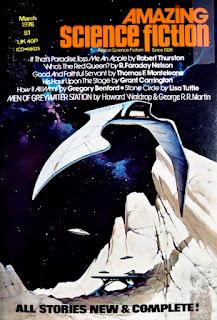 Tom's first cover.
Tom's first cover.Buoyed by his success, Tom set his eyes on New York. “I started pounding the pavement, trying to get a cover on a magazine called Creepy,” he recalled. After a few failures, his first agent encouraged him to try sci-fi. Tom painted a beautiful spaceship against an alien backdrop. That turned out to be his first cover, for the March 1976 Amazing Science Fiction, featuring a story by George R.R. Martin (aside: 43 years later Tom received an email from a scientist informing him that the March ’76 cover got him interested in aerodynamics and wind tunnel testing, and eventually to studying failure modes in US spacecraft). That same year Tom attended the New England Science Fiction Convention, met his second agent, and started selling regularly to New York publishers, including Zebra Books, an imprint of Kensington Books.
Zebra published Tom’s work in a torrent, for the likes of the covers of Black Vulmea’s Vengeance (Robert E. Howard), Lud of London (Talbot Mundy), Andrew Offutt’s The Sign of the Moonbow, Adrian Cole’s The Dream Lords: A Plague of Nightmares, Lin Carter’s paperback revival of Weird Tales, Robert Bloch’s Mysteries of the Worm, and others.
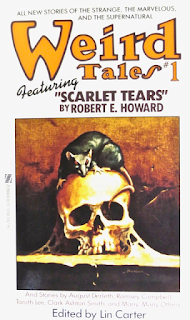 One of my favorites.The rest is history. “I found my niche,” he said.
One of my favorites.The rest is history. “I found my niche,” he said.That history will soon be revealed in full. Tom recently finished a memoir of his creative life, and is currently exploring publishing options.
He’s also still painting, though as much or more of the natural world than S&S and SF. In addition to Frazetta and N.C. Wyeth he’s also a devotee of Claude Monet, and you can see clear inspiration of the French impressionist in his expansive skies and galaxies.
But Tom still takes regular detours into the weird and macabre. His new memoir will feature more than 60 pieces of art. Some are scenes from his life, but others are conceptual, and dark, reflecting his own dark struggles with alcohol addiction. So you’ll experience not just his story, but a large slice of his visual imagination.
Tom discovered his love of speculative fiction from the short-lived TV show Flash Gordon (1954-55), which he watched as boy of eight. Later he discovered Conan and Frank Frazetta. “That took me off into the land of make believe. Or maybe I already had it in me and that woke it up,” he said.
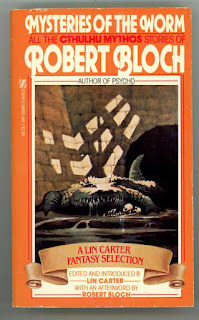 Zebra kept Tom busy...His imagination never stopped working. In fact, he spends a good deal of his time wandering the halls of his mind. As a regular at the Vet Center in White River Junction, VT, attending readjustment counseling, he recalls standing with a bunch other Vets in the kitchen one day. “As I was standing there, one of the psychologists came out and said to the group, ‘you know, just because you see Tom standing here in person, it doesn’t necessarily mean he’s actually here.’ I just spent a lot of my time in other worlds, my head in the clouds, my heart in the stars.”
Zebra kept Tom busy...His imagination never stopped working. In fact, he spends a good deal of his time wandering the halls of his mind. As a regular at the Vet Center in White River Junction, VT, attending readjustment counseling, he recalls standing with a bunch other Vets in the kitchen one day. “As I was standing there, one of the psychologists came out and said to the group, ‘you know, just because you see Tom standing here in person, it doesn’t necessarily mean he’s actually here.’ I just spent a lot of my time in other worlds, my head in the clouds, my heart in the stars.” Tom dwells in other worlds because he’s found this one rather chaotic. He served as a Vietnam-era army medic from 1968-71, providing bedside care for some grievously wounded soldiers returning from the jungle. The experience never left him.
In the early 80s Tom moved to Arizona, leaving behind the east coast and his promising art career. He attempted to keep working but his addiction got the better of him, and for a while he stopped painting altogether. Drinking not only derailed his career but nearly ended his life. He was fortunate to have friends who realized he needed help.
The memoir begins with him finishing off his last beer in a smoky little barroom full of drunk Indians up in Flagstaff, Arizona. This was followed by a 28-day, in-patient rehab program at the VA in Prescott.
“I knew if I didn’t stop drinking, I’d be dead. All the details are in the memoir.”
Tom reads books about Zen Buddhism and has tried meditation with limited success. Painting remains his principal form of meditation, his studio a place where the chaos stills.
After a series of sessions at the VA his counselor recommended Tom put his life to paper. Writing his memoir proved therapeutic.
“She said, ‘Tom, you’ve had an interesting life. Why don’t you write?’ So I went home and starting writing. It took hold, and turned out to be a real eye-opener,” he said. “I was learning about myself, stuff I didn’t realize.”
The book is written for entertainment but also to let others suffering with addiction know that there is a way out. Tom doesn’t care who knows about his struggles. He hopes his story might help them in some way.
“One thing I don’t like about Alcoholics Anonymous is the word ‘anonymous.’ You’re not supposed to tell people,” he said. “Well, I always tell people because you don’t know who you’re standing next to. They could be ready to go home and shoot themselves.”
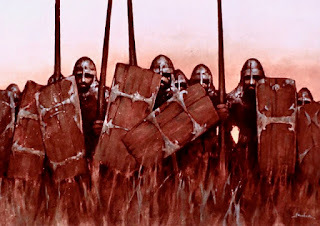 Attack at DawnAt age 78 Tom is a survivor, and likewise his best work stands the test of time. Most of his classic work is in the hands of private collectors. In the noted collection, The Frank Collection: A Showcase of the World's Finest Fantastic Art (Paper Tiger, London, 1999), the following short writeup accompanies his work, “Attack at Dawn”:
Attack at DawnAt age 78 Tom is a survivor, and likewise his best work stands the test of time. Most of his classic work is in the hands of private collectors. In the noted collection, The Frank Collection: A Showcase of the World's Finest Fantastic Art (Paper Tiger, London, 1999), the following short writeup accompanies his work, “Attack at Dawn”:Watching over these sculptures, peering warily above the tops of their shields, is Tom Barber’s small army of armored warriors in Attack at Dawn, a personal work he created circa 1980. This is the first piece we purchased from him. We were immediately drawn to the image, always wondering, who and what army might those soldiers be confronting that morning? We lost track of Tom in the early 80s, when he moved out west to paint western scenes. And no one that we know in the fantasy art world has ever run into him again. That’s a shame because Barber was a great talent and if he had stayed in the field he would today be known to fans around the world.
And then one day, there he was. Sober.
“Attack at Dawn” now resides in the private collection of George R.R. Martin.
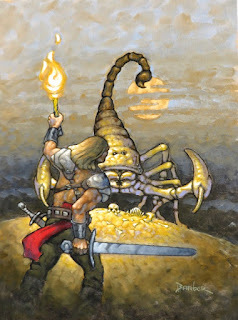 Tom's latest S&S foray.Jane recently asked him to create a new piece of commissioned art. Tom responded with a foray back into sword-and-sorcery, a muscled warrior battling a fearsome giant scorpion.
Tom's latest S&S foray.Jane recently asked him to create a new piece of commissioned art. Tom responded with a foray back into sword-and-sorcery, a muscled warrior battling a fearsome giant scorpion. Today he continues to get occasional jobs, including some covers and private commissions. And he continues to live by the motto:
Art that isn’t shared with the world is only half finished.
August 23, 2024
Can you separate the art from the artist?
That doesn’t mean I have to like Neil Gaiman the person to enjoy his books (and if the current allegations are accurate, he’s a pretty slimy dude). But I can still read and enjoy The Sandman.
Because art is separate from the artist. Anyone who claims they had an inkling of Gaiman’s alleged behavior from reading Coraline is full of shit.
There is no need to learn all about your favorite artists. It used to be you knew almost nothing of SF/F authors, save in the occasional printed interview in Analog or the like.
Let’s step away from Gaiman for a moment, who for obvious reasons is a bit of a lightning rod.
Closer to home for me are writers like Robert E. Howard and H.P. Lovecraft. Both writers of a long-ago age, some of their stories literally published 100 years ago.
Both with well-documented racist beliefs….beliefs which were incredibly common in their day and age. And which aren’t even immediately noticeable in huge swathes of their fiction, regardless.
Both are being read today, and will continue to be read, long after all their critics are dead and forgotten.
You should be reading these guys if you’re a fan of speculative fiction.
You should be reading these guys if you’re a writer of speculative fiction.
You should be reading these guys if you’re a historian of speculative fiction.
If you don’t, you’re missing out on formative writers that will make you a better writer. And great stories that will give you experiences you can’t get anywhere else. And important literary history that will leave blind spots in your understanding of how fantasy fiction came to be today.
Are there some truly abhorrent writers that make this decision murky? Of course. Marion Zimmer Bradley and David Eddings come to mind. I understand why some want to disown these authors and never read them again.
But even these guys can still be read. I won’t stand up for MZB or Eddings like I do Howard and Lovecraft, both because of personal tastes and because I don’t think they’re nearly as good or important. I am not convinced either will be read 100 years from now. In fact, they probably won’t.
But both can still be read. Because we can separate art from artist.
I realize this question is subjective. Every individual’s threshold for offense is entirely unique. Each reader brings his or her own unique experiences to the table. Some readers are afflicted by past traumas they cannot overcome. Some readers are better than others at compartmentalizing.
But that makes the objective statement, “art cannot be separated from artist,” false.
Yes, every artist brings something of his or herself to their writing, but the alchemy of creativity defies analysis. An artist does not pour everything of themselves into every story, they choose what goes in. Or they themselves compartmentalize, pour their self-loathing into evil characters committing bad deeds, in acts of self-introspection.
There are many beloved writers, living and dead, with skeletons in their closet—skeletons we don’t know about, skeletons which will never see the light of day. Because the artist is long dead, or no record of their behavior exists.
Every human being on the planet has skeletons. We just don’t know about many of them. Nor do we have to.
If you happen to be one of those rare birds who watches 30 minutes of local news, reads Neil Gaiman, and stays off the internet—you’d never know about the unfolding scandal. It would not diminish your enjoyment of his books. You don’t know who the artist is beyond what is on the page, and you don’t to have to, to enjoy and appreciate his or her work.
Can you separate art from artist? Ultimately it’s an individual choice.
But if you’re asking me? Of course you can.
And you should.
You already have.
August 18, 2024
Hither Came Conan; A Review
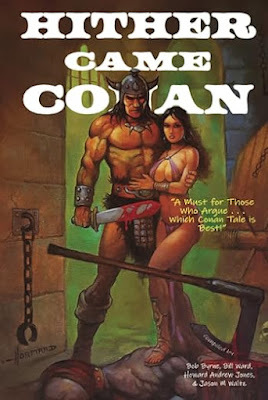 Also a winner of The Valusian Award from
Also a winner of The Valusian Award fromthe Robert E. Howard Foundation.Robert E. Howard Days was wonderful for many reasons, but among them was the opportunity to talk Robert E. Howard, anywhere, anytime, with anyone. Standing in line waiting for barbecue at the pavilion, on a schoolbus tour led by Rusty Burke, or wandering around downtown Cross Plains, everyone was there to talk REH and ready to engage in banter about their favorite tale or their own Howard origin story.
It was like being in a warm blanket of Howard-heads.
Then it was over, and I was thrust back into the hard cold world of the ordinary.
The good news is if you own Hither Came Conan you don’t have to wait a year for a similar experience. Imagine a bunch of folks gathered around a proverbial campfire with an assignment: "Why is this Conan story Howard’s best? You’ve got 10 minutes. Go.” That is the premise of this volume, published in 2023 by the nonprofit publishing house Rogue Blades Foundation.
Hither Came Conan serves as a fine companion to the Conan stories. I can imagine this book serving as an ongoing reference, pulling it off the shelf and seeing what Deuce Richardson or Gabe Dybing has to say when you’ve finished re-reading “Black Colossus” or “The People of the Black Circle” for the eighth time.
This exercise admittedly gets a bit absurd when you are assigned something like “Vale of Lost Women” or the unfinished “Wolves Beyond the Border.” Everything Howard wrote has some minor touch of genius, some cool scene or vivid snatch of poetic prose, but no one can seriously defend the likes of “Vale” as REH’s finest hour. But I give the respective essayists credit for the attempt.
The list is authors assembled for this project is impressive. Wide ranging, from top scholars to fiction authors and ardent fans. People like Patrice Louinet, who stands in the black circle of top Howard scholars (his Hyborian Genesis essays in the Del Reys are a must), Jeff Shanks, David C. Smith, Bobby Derie, Mark Finn, Morgan Holmes, Richardson, many others. But the true spine of the book is “Re-Reading” Conan by Bill Ward and Howard Andrew Jones, a written dialogue which appears with every story including the “Wolves on the Border” fragment and “The Hyborian Age.”
Truth be told I was preoccupied and not paying attention in 2015 when the great Black Gate Conan re-read was going on, and so I missed this series when it first appeared. It is reprinted here in Hither Came Conan and so was new to me. This remains the best part of the book. Ward and Jones engage in a back-and-forth discussion that almost feels like spoken word. Both are of course incredibly complementary to REH and offer shrewd insights into what makes each tale great, or at least solid pulp fare, while largely managing to avoid engaging in hagiography. Neither are afraid to critique REH and talk about which stories or parts of his stories fell flat or conform to predictable pulp formula. I’m still puzzled by Howard (Andrew Jones’) ongoing rejection of “Beyond the Black River” but hey, that’s why you read a book like this. If it was all unadorned praise it would invite no engagement and discussion and get real boring, real fast.
Some of the essays are very good, others are uneven or somewhat uninspired. My own is in here (“Honor Among Thieves: Hyborian Age Morality,” an “Extra, Extra!” essay analyzing “Rogues in the House,”) which in hindsight is OK. I’m my own worst critic. If you’ve read it let me know what you think.
I gleaned a few new insights reading the essays, for example the considerable effort REH placed into “Man-Eaters of Zamboula” after reading John Bullard’s appraisal of Howard’s careful revisions over three drafts. But what is best about this book is the sense of shared admiration for this character, and the varied voices of the wonderful community of fans that have sprung up around him. In that vein I also appreciated the work of editors Jason Waltz and Bob Byrne for also including the voices of the readers of Weird Tales. It gives us a sense of communion with the past, and the knowledge that fans leaving comments on the Black Gate website aren’t so different than fans writing to The Eyrie letters column circa 1932-37.
Indeed any evaluation of Robert E. Howard and Conan involves a communion with a time and place nearly 100 years ago. But one that thankfully shows no signs of slipping into the past, thanks to new volumes like this.
August 15, 2024
The Battle of Evermore and the timeless nature of fantasy
(early metal-ish Friday)
That it is told in the language of fantasy is not an accident, or because Tolkien was an escapist, or because he was writing for children. It is a fantasy because fantasy is the natural, the appropriate language for the recounting of the spiritual journey and the struggle of good and evil in the soul.
--Ursula LeGuin, “On Fantasy and Science Fiction”
The critics who have dismissed fantasy as juvenile escapism have failed to recognize that fantasy grapples with real and eternally pressing issues, albeit wrapped in metaphor and fantastic trappings.
The same critics who worship at the altar of realism and extol the virtues of novels about average people in familiar times cannot admit their darlings have rapidly aged and are fast losing their relevance. While the classics of fantasy remain as fresh today as the day they were written.
That’s because the language of fantasy is unbound by time, or place. It deals with the big issues—conflict within and without, love, sorrow, friendship, the inevitable march of time, pain, decay and death—in poetic abstraction, and in heroic meter and timbre. Modern novels that reference an author’s time and place will confuse the modern reader with surroundings that grow increasingly abstract and impenetrable with the passing years, while the Hyborian Age or Middle-Earth remain eternally familiar and inhabitable even as their authors slip further into the past. They are distanced from the ordinary, but close to the human heart.
The Battle of Evermore will still be played 100 years from now, though perhaps never as well as this version by Heart. Because we all grasp its emotional depths, and understand the meaning of the plaintive cries.
The apples turn to brown and black
The tyrant's face is red
Oh war is common cry
Pick up your swords and fly
We’re always trying to bring the balance back. It’s the eternal struggle never won, but once in a while we experience the blessed peace of equilibrium.
The Battle of Evermore will still be played 100 years from now, and remain as unspoiled as Lothlorien, because it is the timeless matter of fantasy.
August 5, 2024
A review of Metallica, August 2nd 2024, Gillette Stadium
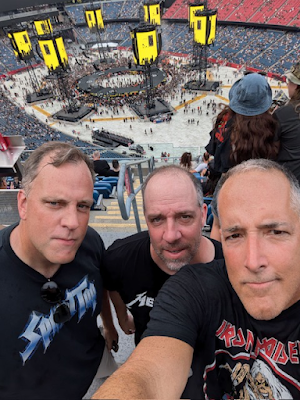 Nosebleed seats but what a view!Metallica isn’t the best heavy metal band on the planet (that would be Iron Maiden or Judas Priest, take your pick) but they’re undoubtedly the biggest. A loyal following of metal diehards coupled with massive crossover appeal to a broader audience of casual hard rock fans and event seekers makes their shows a true event.
Nosebleed seats but what a view!Metallica isn’t the best heavy metal band on the planet (that would be Iron Maiden or Judas Priest, take your pick) but they’re undoubtedly the biggest. A loyal following of metal diehards coupled with massive crossover appeal to a broader audience of casual hard rock fans and event seekers makes their shows a true event. But even I didn’t think Metallica was capable of selling out two nights at Gillette Stadium. They proved me wrong.
Here we are 40 years later with the band in their early 60s, bigger than ever and still sounding fantastic.
I greatly enjoyed the Friday night August 2nd show and left happy and impressed. I didn’t necessarily think that would be the case going in.
I spent some years pissed at Metallica after they abandoned the angry thrash of their first four albums, all genuine metal classics. I no longer harbor any resentment about their drift into mainstream hard rock, or even their St. Anger nu metal flirtation. As I told my buddy today I don’t believe Metallica deliberately sold out on the black album; I think they were just evolving in a direction I didn’t particularly care for.
But there is no doubting the showmanship and passion that marks the second half of their career. And they still play the hell out of the old hits. Metallica opened with three deep cuts and ended with two more. And they played “Orion,” which genuinely surprised me and was a personal highlight. Here’s the setlist:
• Creeping Death• Harvester of Sorrow• Leper Messiah• King Nothing• 72 Seasons• If Darkness Had a Son• Foxboro on the Run (Kirk and Rob doodle)• The Day That Never Comes• Shadows Follow• Orion• Nothing Else Matters• Sad But True• Hardwired• Fuel• Seek & Destroy• Master of Puppets
Yeah, Sunday had a better setlist overall, but fans at that show had to put up with driving rain and lightning delays and lousy opening acts. We got Pantera. I’m happy with our show.
I’ve seen Metallica on a couple occasions but this was the first in a long while, and if I’m correct the first with Robert Trujillo. Who I was surprised to hear has been with the band longer than any other bass player. Jason Newstead had a run of 15 years, Trujillo has been with Metallica since 2003. His audition is famously covered in the recommended show and tell-all documentary “Some Kind of Monster.” He’s a talented player with incredible energy.
The band sounded tight, Hetfield’s vocals were on point, and I enjoyed Kirk’s soloing on a number of custom guitars (including his famous purple and gold-lettered Ouija board painted job). “Creeping Death” right out of the gate set the tone for a high-energy show. The concert did seem to sag a bit in the middle, from “72 Seasons” through “Shadows Follow,” but that might have been because I didn’t know the material. Most of the fans were into it. But again “Orion” floored me and “Fuel” was explosive. “Master of Puppets” was a fantastic closer. The sound system and the tower screens (see accompanying pic) surrounding the stage were impressive. Metallica must have hung around for at least 10 minutes after the show thanking the fans and horsing around on stage, a nice touch.
Tailgating is a major part of the concert experience for me and we didn’t slack off that aspect. The three of us set up three folding camp chairs in a Dunkin Donuts parking lot, drank lite beer and shot the shit about old times as customers purchased ice coffee and crullers at the drive-thru window.
July 26, 2024
Orion, Metallica
"Orion" oozes nostalgia and loss, which I'm possibly projecting knowing that its architect Cliff Burton died just six months after its release. It feels like a dirge--and it very much is. The song was played over speakers during Burton's funeral, and James Hetfield had notes from the song's bridge tattooed on his left arm.
Incredible.
38 years after its release "Orion" remains a beautiful piece of work, haunting and atmospheric and utterly unique. The break at the four minute mark, broken when Cliff comes back in alone with his bass, is perhaps the high water mark on a magnificent album.
I can't even tell you how many times I listened to "Orion" in high school, driving around aimlessly with Master of Puppets in my car stereo. I relish those days.
I'm hoping I might hear it when I see Metallica next Friday at Gillette Stadium. Highly unlikely as Metallica almost never plays it live, likely out of respect for their late bassist. We'll see.
July 17, 2024
Treasure Island and the powerful call to adventure
Reading has been OK. I did manage to finish Ursula LeGuin’s Tehanu and Robert Louis Stevenson’s Treasure Island while on vacation last week, and have since moved on to Beowulf and Other Old English Poems.
Treasure Island was a treat. I hadn’t read this since I was a kid and it holds up extremely well, both from the perspective of an adult reading a book ostensibly for young men (it was first published in serialized fashion for Young Folks, a children’s magazine), but also a work written in 1881. It’s bloody, but relatively bloodless, the violence ample though at a slight remove. The action however never stops, and the atmosphere and plotting are things of beauty. Pure, mainlined adventure from page one.
Treasure Island was published as a standalone novel in 1883, a time when literary realism and literary modernism were in the ascendancy, and so was a bit of an anachronism, a throwbacks to the historical romances of the likes of Sir Walter Scott. But it nevertheless proved immediately popular with the reading public and even many critics of the age.
I read a 1930 edition (Windsor Press) with a fascinating introduction by Harry Hansen, “How Robert Louis Stevenson Wrote Treasure Island.” In addition to an interesting story behind the physical writing, publishing history and critical reception, I learned of another chapter waged in the well-grooved war of realistic vs. fantastic fiction. Henry James, perhaps the greatest practitioner of slice-of-life/realistic fiction, enjoyed the book himself—but nevertheless critiqued it during a symposium on the art of fiction in 1884. James was “unable to come to grips with the author because it did not touch his own experience,” Hansen writes. James further stated, “I have been a child, but I have never been on a quest for buried treasure.”
Word reached Stevenson. Though he never claimed Treasure Island was more than an adventurous narrative, Stevenson felt the need to defend his work and expound on the artists’ urge to create fantastic stories full of vicarious experience removed from our own. “The creative artist takes certain characters, incidents, motives out of the vast store of living and arranges them to suit his mind,” he wrote, adding that a creative author “both selects from life and expands the slightest incidents, possibly even more successfully when they relate not to what he has actually done but what he has wished to do.”
Stevenson adds a final beautiful rejoinder to James, quoted verbatim by Hansen:
If he has never been on a quest for buried treasure, it can be demonstrated that he has never been a child. There never was a child (unless Master James) has but hunted gold, and been a pirate, and a military commander, and a bandit of the mountains; but has fought, and suffered shipwreck and prison, and imbrued its little hands in gore, and gallantly retrieved the lost battle and triumphantly protected innocence and beauty.The only thing missing was the N.C. Wyeth illustrations I remember so vividly from my childhood in whatever edition I first enjoyed, decades ago. This edition had fine black and white illustrations by Lyle Justis, but Wyeth of course is a master.
While I remain on a bit of a reading break from sword-and-sorcery Treasure Island is definitely part of its DNA.
***
Tehanu was a lovely read, LeGuin at the height of her literary powers, and I will probably have more to say about it later. Not as soaring or epic as the original Earthsea trilogy but a stirring coda. And quite a distinct experience from Treasure Island, reserved and reflective. It was sitting on my shelf for years and I finally plucked it off and read it, and am glad I did.



